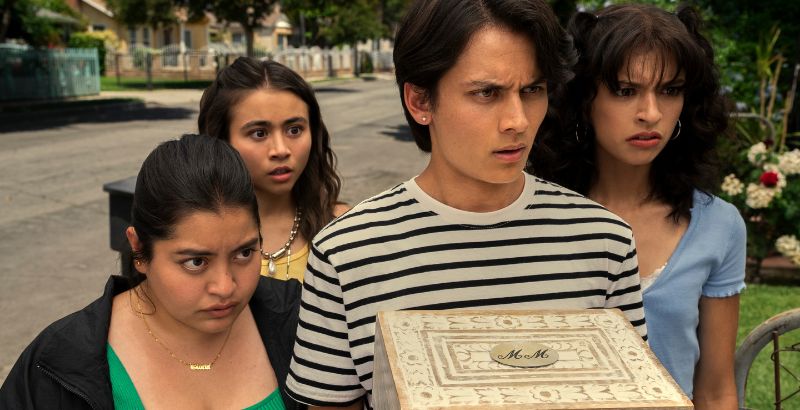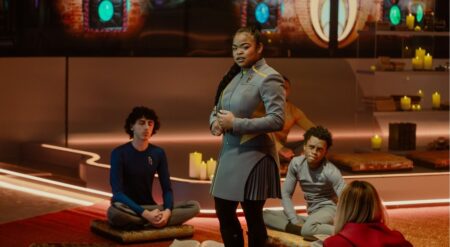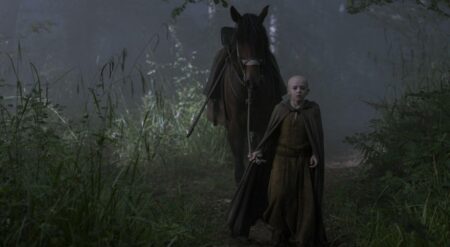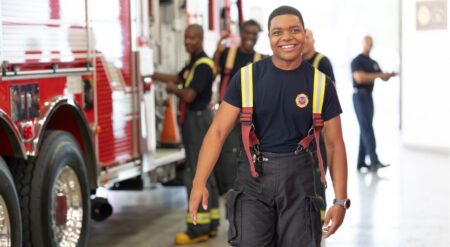Freeridge is a Netflix Original coming-of-age comedy spun off from On My Block surrounding a group of friends who get cursed by a box that belonged to a dead woman who’s now following them around while they deal with the ups and downs of friendship, relationships, and sisterhood.
It’s well-documented how much I can’t stand stories that fix their entire plot upon characters simply refusing to communicate. Freeridge is a show where, for every one of its 8 half-hour episodes, the moment somebody finally tells somebody else the truth, they get caught up in another lie, omission, or secret. It’s a whiplashing experience that perturbed me as much as it elated me. Sure, the drama of the week was constantly obvious and avoidable, but at least the kids on this show do what too few shows ever let their characters do before there are only 10 minutes left: they actually communicate. Or, they try to, anyway.
Freeridge is a decent show because it’s funny, has endearing characters, and isn’t too heavy-handed. It does have a few too many moments where I can’t tell whether a joke is a reference to the original show that I’m not understanding or if it’s just not landing because I’m too preoccupied trying to discern whether it’s a reference to the original show or not. But there are plenty of laugh-out-loud moments from one end of every episode to the next. And all of the characters are fun and dynamic in their own ways.
The main character, Gloria (Keyla Monterroso Mejia) is full of great quips, but she’s also controlling, demanding, and overly mothering towards her sister Ines (Bryana Salaz). Of course, all of these qualities come from a place of deep pain over her mother’s death ten years prior. She’s quite nuanced in her construction, always balancing her aggravating qualities with great humor and even greater understanding of what makes her act how she does.
No matter how much you wish she would get some comeuppance now and again for how she treats her friends and family, you can’t blame her for feeling like the burden of her whole family is on her shoulders. Plus she’s just downright hilarious and Mejia just plays the heck out of this character. The tension constantly between Gloria and Ines is one of the most gut-punching parts of the show. There’s so much pain hidden underneath all of their fun jokes and antics, and it makes you want them to get to a better place together so badly.
Freeridge is a decent show because it’s funny, has endearing characters, and isn’t too heavy-handed.
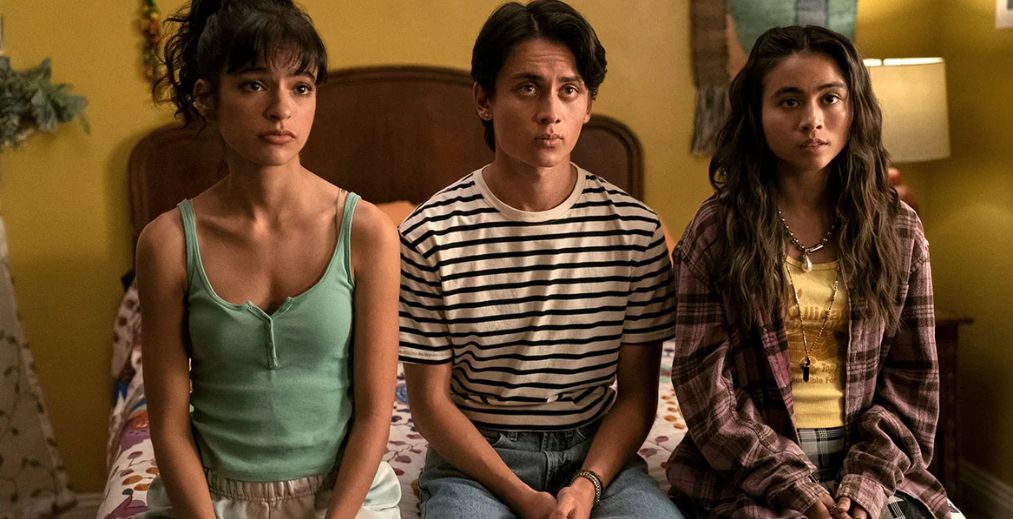
Meanwhile, Cameron (Tenzing Norgay Trainor) and Demi (Ciara Riley Wilson) who round out the core friend group supply even more comic relief with their season-long B-plot involving confronting internalized biophobia, an overly-attached boyfriend (Zaire Adams) who himself is a bright spot in the show every time he shows up, a podcast, Demi’s conviction that she’s a fledgling bruja, and a lot of good earnest conversations. I appreciate the calmer balance they bring to the show over Gloria’s constant frenetic energy and Ines’s smoldering attitude. They’re just figuring themselves out and that’s really the most a coming-of-age story can hope to do.
But while they grow, Gloria and Ines really don’t get the chance to. You can tell that they’re ripe for it, and should Netflix be so bold as to renew a deserving show for a second season for once, they will hopefully get to. And this difference is for one obvious reason: Cameron and Demi learn how to communicate and neither Gloria nor Ines ever do.
They always walk right up to the truth and then either turn at the last minute or get caught in some other un-truth immediately after admitting to the last one. That’s okay though. At least they’re trying and you can see both where they get it from in their dad’s terrible communication and where they have the potential to course-correct.
Even if some of the constant cycles of learning and forgetting lessons get to be a bit much after a while, every episode is directed or edited uniquely, with most episodes taking advantage of some editing trick or storytelling device that carries throughout the episode and makes it unique. Especially given the comedy nature of the show, these kinds of gimmicks just add to the levity in a show that’s underlying pain and hardship could easily become overbearing.
Also, Rusty (Michael Solomon) is one of the best communicators ever written. He’s not only a sweet guy who gives exceptional motivational advice and affirmation, but he’s also a shining example of how to write a character that gets into relational drama without it all having to rely on poor communication at its core. Please, writers, write more characters like Rusty more often. And it’s great that the show just simply lets a fat girl have a tall, attractive love interest without ever having to crack a single joke about her size or their side-by-side comparison.
It has its moments where jokes don’t land, and it saves too much of its most important characters’ potential and much-deserved growth for a planned second season that current trends don’t offer great promise about. But otherwise, Freeridge is a funny, covertly devastatingly sad body of proof that teenagers are actually at their best when they’re working through their problems out loud together, whether those problems are absurd or upsetting. The characters all benefit from that relieving honesty and on the whole, the show benefits from being consistently uplifted by the truth, even if they still find other ways to keep digging themselves into entertaining new holes nonetheless.
Freeridge (2023) is available to stream exclusively on Netflix. Freeridge was cancelled by Netflix after season 1.
Freeridge
-
Rating - 8/108/10
TL;DR
Freeridge is a funny, covertly devastatingly sad body of proof that teenagers are actually at their best when they’re working through their problems out loud together, whether those problems are absurd or upsetting.

